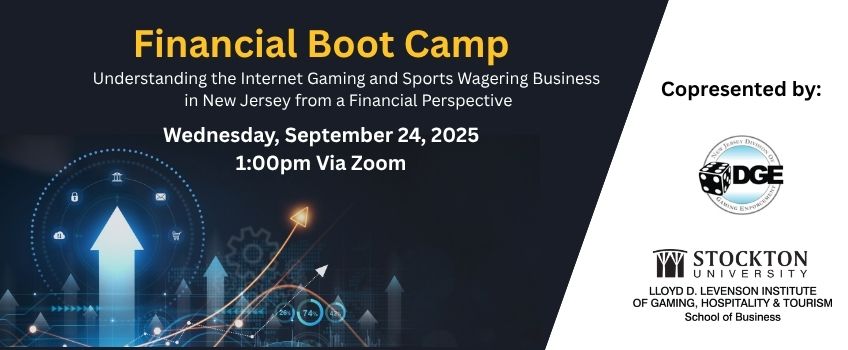Who’s Getting the Money? Understanding the Internet Gaming and Sports Wagering Business in New Jersey

By Christopher Glaum, Chief of Investigations, New Jersey Division of Gaming Enforcement and Charity Yeoman, Administrator of Investigations, Office of Financial Investigations, New Jersey Division of Gaming Enforcement
Prior to internet gaming and sports wagering, the casino industry was, in contrast to today, less complicated to analyze. The entire revenue stream came from operating a brick-and-mortar casino. Thus, from a gross revenue perspective, all the information needed to understand the Atlantic City casino industry came from the data made public by the Division of Gaming Enforcement (DGE) each month. Today, the analysis of gross revenues is
Christopher Glaum
Chief of Investigations, New Jersey Division of Gaming Enforcement
Charity Yeoman
Administrator of Investigations, Office of Financial Investigations, New Jersey Division of Gaming Enforcement
particularly challenging, due primarily to the various approaches taken by casinos and racetracks to monetize the internet gaming and sports wagering business in New Jersey. In fact, the overwhelming majority of online revenues are now generated by entities that are not Atlantic City casinos, which leads to a key question: “Who’s getting the money?” We focus on that question in this article.
First, some history. In early 2013, the enabling statute for internet gaming provided casinos in Atlantic City with the exclusive ability to operate online casinos. Each casino was permitted to have up to five internet gaming operations, which we refer to herein as “skins.” In early 2018, the sports wagering statute provided Atlantic City casinos and New Jersey racetracks with the ability to have sports wagering lounges within their facilities and up to three online skins per property.
With up to eight total skins available for casinos and three online sports wagering skins available for racetracks, different approaches were used to monetize the Internet gaming and sports wagering business, each of which can be classified into the following broad categories:
Casino Skin
Affiliate Skin
Third-Party Skin
Joint Venture Skin
Since each skin can be placed into one of these four categories, we can use the financial data made public by DGE on a monthly and quarterly basis to assess the gross revenues generated by each of these categories. To this end, DGE issues a monthly press release with gross revenue and statistical data for land-based casinos, internet gaming and sports wagering. Recently, DGE made changes to the monthly press release to report gross revenue for internet gaming and sports wagering by skin, rather than by the casino or racetrack with which the skin is affiliated. DGE’s revised reporting approach now reflects the primary beneficiary of the gross revenues related to each skin operation and improves consistency, comparability and transparency industry wide.
DGE also makes public the quarterly financial reports filed by the casinos. In the footnotes to the financial statements, casinos are required by the DGE to disclose certain information related to each of their skins, including the type of business arrangement. It should be noted, however, that the terms and payment streams between casinos/racetracks and third parties can vary widely. While we can place each skin into one of the categories above, that does not mean that every arrangement within that category has similar terms or payment arrangements.
Armed with publicly available data, let’s take a look at the growth in the internet gaming and sports wagering gross revenues over the years and evaluate the seismic shift in the gross revenue distribution among casinos, affiliates, third parties and the BetMGM joint venture. For this exercise, we will compare calendar year 2016 to 2024.
For 2016, internet gaming gross revenues were only $197 million industry-wide and sports wagering did not exist. At that time, around 70% of internet gaming gross revenues were generated by Casino Skins and Affiliate Skins, while approximately 30% were generated by Third-Party Skins. Thus, at that point, the online gaming market was heavily weighted toward Casino Skins and Affiliate Skins, with a much lower contribution by Third-Party Skins. There were no Joint Venture Skins in 2016, as the BetMGM joint venture did not exist until 2018.
Atlantic City Casino Industry
Internet Gaming and Online Sports Wagering Gross Revenue
For the Year Ended December 31, 2024 vs. 2016
($ in Millions)
Gross Revenue
2016
2024
Growth
% Gross Revenue
2016
2024
% pt. Change*
Casino Skins
Affiliate Skins
Third-Party Skins
Joint Venture Skins
Total
*formula edited to address rounding
From 2016 to 2024, the online gaming landscape changed dramatically. First and foremost, sports wagering was legalized in 2018. Second, strong Third-Party Skins such as FanDuel and DraftKings entered the market and the BetMGM joint venture commenced operations. Third, the COVID-19 pandemic created a favorable operating environment for online gaming operators as an alternative to in-person gaming in Atlantic City. Fourth, the inventory of Internet gaming slot machine games and table games, as well as “Live Dealer” table games, significantly increased the gaming options for online customers. Lastly, online operators took advantage of the cross-marketing synergies between internet gaming and sports wagering.
As a result, between 2016 and 2024, internet gaming gross revenue increased by $2.190 billion, from $197 million to $2.387 billion, respectively. Online sports wagering did not exist in 2016, and gross revenues were $1.061 billion in 2024. Combined, the gross revenue from internet gaming and online sports wagering grew by $3.251 billion, from $197 million in 2016 to $3.448 billion for 2024. The table above shows the substantial growth in online revenues, as well as the shift in the market from Casino Skins and Affiliate Skins toward the dominant role now played by Third-Party Skins and Joint Venture Skins.
In addition to the revenue growth, the proportion of revenues from each type of skin arrangement changed considerably. Most significantly, Third-Party Skins FanDuel and DraftKings were not operating in 2016 but ranked first and second in the market with combined gross revenues of $966 million and $804 million for 2024, respectively. The third highest revenue generator, BetMGM, also was not operating in 2016 but had gross revenues of $618 million for 2024 across four brands. Together, these three operators had combined internet gaming and sports wagering gross revenues of $2.388 billion for 2024, reflecting over 73% of the overall growth in revenues between 2016 and 2024.
around 86% of the gross revenues for Internet gaming and online sports wagering came from Third-Party Skins and Joint Venture Skins in 2024."
Largely as a result, around 86% of the gross revenues for internet gaming and online sports wagering came from Third-Party Skins and Joint Venture Skins in 2024. Meanwhile, only 11% of gross revenue was generated by Affiliate Skins and less than 3% of gross revenue came from Casino Skins. This reflects a combined 56-percentage point shift from 2016 in terms of Casino/Affiliate Skins versus Third-Party/Joint Venture Skins and clearly highlights the current state of the internet gaming and sports wagering business in New Jersey.
The dramatic growth in revenues and the current dominance by Joint Venture Skins and Third-Party Skins have major implications for the Atlantic City casinos, including revenue recognition, as well as with respect to the Atlantic City PILOT. These topics can be complicated and nuanced, so on Wednesday, September 24, 2025 at 1 p.m., the authors of this article will provide a crash course entitled “Financial Boot Camp: Understanding the Internet Gaming and Sports Wagering Business in New Jersey from a Financial Perspective.” Participants will further discuss the various business arrangements used by casinos and racetracks, as well as evaluate the effect of these arrangements on monthly and quarterly financial filings submitted to the DGE. Participants will also develop a greater understanding of how and to what extent the gross revenues derived from internet gaming and sports wagering are shared by casinos, racetracks, affiliates and third-party operators – with implications for the state and the Atlantic City economy.
Watch a recording of the September 24, 2025 webinar






